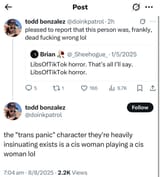Search Results
8/9/2025, 2:24:55 AM
>>213511133
>2. Gruff, masculine dad Archer pursues his son Matthew into a mirrored replica of their home, presided over by a giant floating AR-15. Eventually he finds the boy nestled under the Batman blanket in his bedroom. The child’s expression is blank. Nevertheless, Archer tearfully declares his grief for the boy’s loss. In a flash, however, we see that his son is no longer in the bed: he has been replaced by an old woman, wigged in gaudy orange, her howling countenance smeared with the same excessive make-up that plastered Alex’s features in the first dream.
>If Zach Cregger thought these scenes had anything to communicate in relation to school shootings, as that symbolic assault rifle would indicate, the idea is hopelessly muddled. There is nothing about the content of these dreams, nor the film’s scenario in general, that even remotely resembles a school shooting: “communal tragedy involving children” is about as specific as the parallel gets. Instead, the imagery Cregger has chosen—the invasion of safe, familiar spaces (the home, the classroom), monstrous femininity, and, most centrally, the corruption of children, laden with unnervingly sexual implications (the make-up, the stranger in the child’s bed)—directly recalls, intentionally or not, decades of conservative moral panic about children.
>Initially, the movie postures at commenting on this very phenomenon. The parents of the missing children, at a loss as to how to explain the disappearances, seek an external actor on which to vent their rage. The significantly more disturbing possibility—that the children might have chosen to do this for reasons that remain obscure—is unfathomable for them, because reactionaries cannot recognize children as autonomous agents. In the mob’s search for a scapegoat, they irrationally single out Justine. The comment on the ongoing persecution of teachers in this country is obvious enough.
>2. Gruff, masculine dad Archer pursues his son Matthew into a mirrored replica of their home, presided over by a giant floating AR-15. Eventually he finds the boy nestled under the Batman blanket in his bedroom. The child’s expression is blank. Nevertheless, Archer tearfully declares his grief for the boy’s loss. In a flash, however, we see that his son is no longer in the bed: he has been replaced by an old woman, wigged in gaudy orange, her howling countenance smeared with the same excessive make-up that plastered Alex’s features in the first dream.
>If Zach Cregger thought these scenes had anything to communicate in relation to school shootings, as that symbolic assault rifle would indicate, the idea is hopelessly muddled. There is nothing about the content of these dreams, nor the film’s scenario in general, that even remotely resembles a school shooting: “communal tragedy involving children” is about as specific as the parallel gets. Instead, the imagery Cregger has chosen—the invasion of safe, familiar spaces (the home, the classroom), monstrous femininity, and, most centrally, the corruption of children, laden with unnervingly sexual implications (the make-up, the stranger in the child’s bed)—directly recalls, intentionally or not, decades of conservative moral panic about children.
>Initially, the movie postures at commenting on this very phenomenon. The parents of the missing children, at a loss as to how to explain the disappearances, seek an external actor on which to vent their rage. The significantly more disturbing possibility—that the children might have chosen to do this for reasons that remain obscure—is unfathomable for them, because reactionaries cannot recognize children as autonomous agents. In the mob’s search for a scapegoat, they irrationally single out Justine. The comment on the ongoing persecution of teachers in this country is obvious enough.
Page 1
